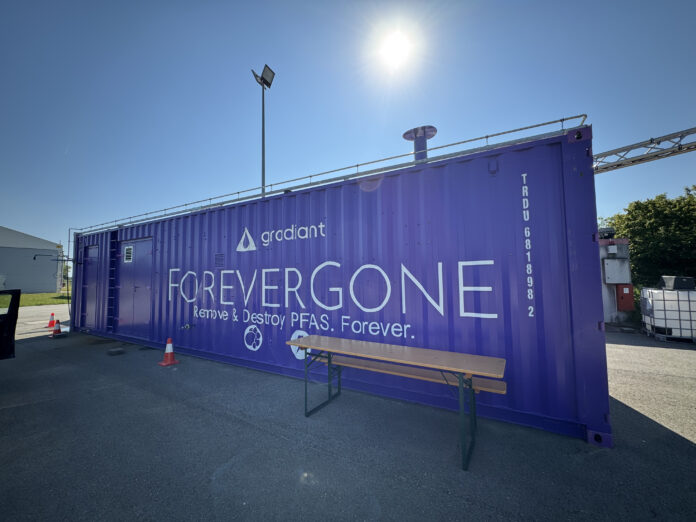BOSTON, Mass.– Gradiant, a global provider of advanced water and wastewater solutions, announced advancements in its ForeverGone PFAS destruction platform, establishing it as one of the most cost-effective and sustainable methods for eliminating “forever chemicals” in industrial wastewater. The company also confirmed the commissioning of a ForeverGone system at Munich International Airport to address contamination from aqueous film-forming foam (AFFF).
ForeverGone is the first fully integrated platform that destroys PFAS compounds at the source by pairing micro-foam fractionation with advanced electrooxidation to achieve 99–99.9 percent removal, including short-chain PFAS often missed by older technologies. Unlike granular activated carbon or ion exchange resin, which capture and dispose of PFAS, ForeverGone eliminates them entirely, removing the need for disposal and reducing environmental risks. The system operates at just $0.10–$0.20 per cubic meter, far below the $0.50–$2.00 per cubic meter costs of conventional methods, with energy use of only 0.5 kWh per cubic meter as its primary operating expense.
“ForeverGone is the new model for how industries tackle PFAS,” said Anurag Bajpayee, co-founder and CEO of Gradiant. “By destroying PFAS at the source, we remove the burden of disposal and deliver compliance that is both cost-effective and sustainable. Regulations in Europe and Asia are accelerating adoption, while U.S. industries are preparing for the inevitable. ForeverGone gives customers confidence to meet today’s standards and tomorrow’s.”
The deployment at Munich International Airport demonstrates the platform’s effectiveness in high-profile, legacy contamination sites. Following a four-year development program, Gradiant reduced the footprint of its electrooxidation unit by more than 100 times, making the system compact, mobile, and adaptable for permanent installations or temporary remediation. Demand for PFAS destruction is increasing globally as regulations tighten, with Taiwan introducing semiconductor discharge limits of 1.2 ppb, South Korea placing industrial discharges under greater scrutiny, and China implementing stricter drinking water standards. Europe has already adopted aggressive PFAS restrictions, while upcoming U.S. EPA guidance is expected to accelerate implementation across industries.
In addition to PFAS, Gradiant is engaging with pharmaceutical customers on trifluoroacetic acid (TFA), a compound linked to drug manufacturing byproducts. The European Union is expected to decide on TFA regulation in 2026, potentially opening a new market for ForeverGone and related technologies.


